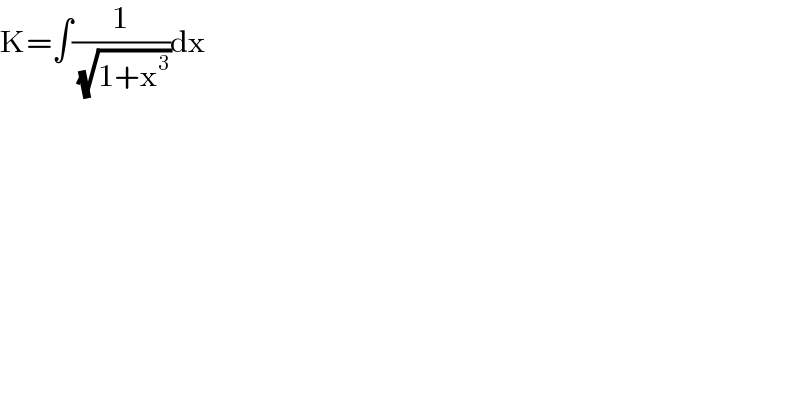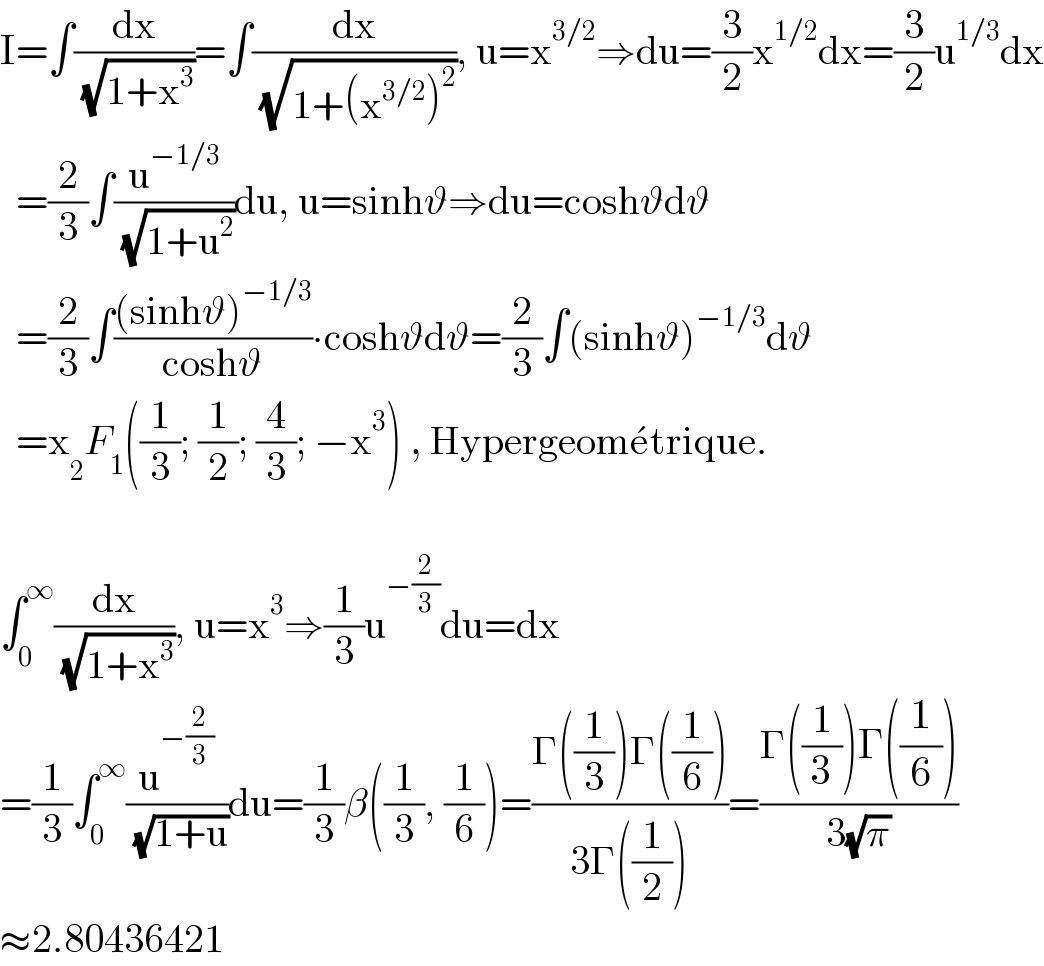
Question Number 146212 by puissant last updated on 12/Jul/21

$$\mathrm{K}=\int\frac{\mathrm{1}}{\:\sqrt{\mathrm{1}+\mathrm{x}^{\mathrm{3}} }}\mathrm{dx} \\ $$
Answered by Ar Brandon last updated on 12/Jul/21

$$\mathrm{I}=\int\frac{\mathrm{dx}}{\:\sqrt{\mathrm{1}+\mathrm{x}^{\mathrm{3}} }}=\int\frac{\mathrm{dx}}{\:\sqrt{\mathrm{1}+\left(\mathrm{x}^{\mathrm{3}/\mathrm{2}} \right)^{\mathrm{2}} }},\:\mathrm{u}=\mathrm{x}^{\mathrm{3}/\mathrm{2}} \Rightarrow\mathrm{du}=\frac{\mathrm{3}}{\mathrm{2}}\mathrm{x}^{\mathrm{1}/\mathrm{2}} \mathrm{dx}=\frac{\mathrm{3}}{\mathrm{2}}\mathrm{u}^{\mathrm{1}/\mathrm{3}} \mathrm{dx} \\ $$$$\:\:=\frac{\mathrm{2}}{\mathrm{3}}\int\frac{\mathrm{u}^{−\mathrm{1}/\mathrm{3}} }{\:\sqrt{\mathrm{1}+\mathrm{u}^{\mathrm{2}} }}\mathrm{du},\:\mathrm{u}=\mathrm{sinh}\vartheta\Rightarrow\mathrm{du}=\mathrm{cosh}\vartheta\mathrm{d}\vartheta \\ $$$$\:\:=\frac{\mathrm{2}}{\mathrm{3}}\int\frac{\left(\mathrm{sinh}\vartheta\right)^{−\mathrm{1}/\mathrm{3}} }{\mathrm{cosh}\vartheta}\centerdot\mathrm{cosh}\vartheta\mathrm{d}\vartheta=\frac{\mathrm{2}}{\mathrm{3}}\int\left(\mathrm{sinh}\vartheta\right)^{−\mathrm{1}/\mathrm{3}} \mathrm{d}\vartheta \\ $$$$\:\:=\mathrm{x}\underset{\mathrm{2}} {\:}{F}_{\mathrm{1}} \left(\frac{\mathrm{1}}{\mathrm{3}};\:\frac{\mathrm{1}}{\mathrm{2}};\:\frac{\mathrm{4}}{\mathrm{3}};\:−\mathrm{x}^{\mathrm{3}} \right)\:,\:\mathrm{Hypergeom}\acute {\mathrm{e}trique}. \\ $$$$ \\ $$$$\int_{\mathrm{0}} ^{\infty} \frac{\mathrm{dx}}{\:\sqrt{\mathrm{1}+\mathrm{x}^{\mathrm{3}} }},\:\mathrm{u}=\mathrm{x}^{\mathrm{3}} \Rightarrow\frac{\mathrm{1}}{\mathrm{3}}\mathrm{u}^{−\frac{\mathrm{2}}{\mathrm{3}}} \mathrm{du}=\mathrm{dx} \\ $$$$=\frac{\mathrm{1}}{\mathrm{3}}\int_{\mathrm{0}} ^{\infty} \frac{\mathrm{u}^{−\frac{\mathrm{2}}{\mathrm{3}}} }{\:\sqrt{\mathrm{1}+\mathrm{u}}}\mathrm{du}=\frac{\mathrm{1}}{\mathrm{3}}\beta\left(\frac{\mathrm{1}}{\mathrm{3}},\:\frac{\mathrm{1}}{\mathrm{6}}\right)=\frac{\Gamma\left(\frac{\mathrm{1}}{\mathrm{3}}\right)\Gamma\left(\frac{\mathrm{1}}{\mathrm{6}}\right)}{\mathrm{3}\Gamma\left(\frac{\mathrm{1}}{\mathrm{2}}\right)}=\frac{\Gamma\left(\frac{\mathrm{1}}{\mathrm{3}}\right)\Gamma\left(\frac{\mathrm{1}}{\mathrm{6}}\right)}{\mathrm{3}\sqrt{\pi}} \\ $$$$\approx\mathrm{2}.\mathrm{80436421} \\ $$
Commented by puissant last updated on 12/Jul/21

$$\mathrm{merci}\:\mathrm{mais}\:\mathrm{on}\:\mathrm{ne}\:\:\mathrm{peut}\:\mathrm{faire}\:\mathrm{ca}\:\mathrm{avec}\:\mathrm{le}\:\mathrm{theoreme} \\ $$$$\mathrm{des}\:\mathrm{residus}..?? \\ $$
